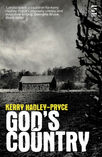Psychodography
- Kerry Hadley
- Feb 27, 2019
- 2 min read

I walked 21.7km with my dog, Rufus, a couple of days ago. Don't ask me why it's complicated. The weather? The heck of it? Yes and yes. We drifted off down the canal towpath, Rufus and I, ending up the other side of Kinver, near Wolverley. I did a lot of thinking - what Loffler would refer to as 'alert reverie.' The thing about walking with a dog is: (a) safety (Rufus would protect me from my own family, let alone a real threat); (b) company that doesn't require conversation; (c) not looking like a complete weirdo; (d) being able to think. Now, I haven't written anything for a week or more, and the thinking was confusing. I like to have a break from writing. I like to step away from it and observe what it looks or feels like from a distance. I know this process, this stepping back, is part of my writing process. I know the confusion is. Distance helps me put things into place. Then yesterday I bumped into Jackie. She was smoking a cigarette outside the University. She said she was glad to see me because she wanted to talk about psychogeography. She actually wanted to talk about the psychogeography of the crime writing process. She said she'd been thinking about how crime writers visit and re-visit the place or psychogeography of their place, or murder scene, and wondered how that affected the plot. She asked if there was a name. Was it 'hyper-psychogeography' or 'multi-psychogeography'? I told her about Chapin Ross' thesis, and Loffler, and how they concentrate on literary psychogeography from the point of view of the reader, but it was possible to re-construct that as something from the point of view of the writer. Afterwards, I thought about this, and came across this article: https://www.visitmanchester.com/ideas-and-inspiration/blog/read/2019/02/i-have-always-been-attracted-to-the-uncanny-an-interview-with-author-nicholas-royle-publisher-at-nightjar-press-b768?fbclid=IwAR3BuXwCyd6M_lc_Fm2kPP4Bf_7F4ydR2UYpvSn-kI9emeruTnVadqnpamk in which Nick Royle briefly says something about the writer 'inhabiting and creating'. And, of course, that's what writers do: we inhabit a place in our heads, and create something - a plot - there. He's talking about his love of the uncanny, Nick is, but there are links to psychogeography, I think. And I realised that in God's Country, I'm seeking out untapped aspects of the Black Country. Setting it on a farm is not what you might expect, but it might be the uncanny nature of people and events that is working on my own (hyper)psychogeographic writing process. Perhaps it is this, psychogeography, that forges the meeting of minds between writer and reader, and the fact that I know I have to leave more questions than answers, leaving an open door, or an untrodden path for the reader to follow if that's what they want to.
By coincidence, I also read this:
https://tobylitt.wordpress.com/2019/02/13/sensibility/ in which Toby Litt says, of handwriting: 'You are inhabiting your sentences, allowing them to pass through your body in a less distanced way than if you simply type them out.' I think he has a point.









Comments